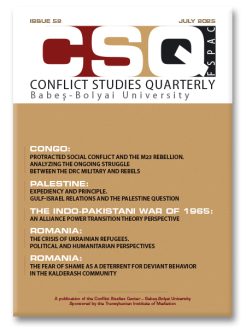
Issue 52 – July 2025
TOPICS: M23 Rebellion, the Palestine Question, the 1965 Indo-Pakistani War, Ukrainian refugees, shame
Coordinator:
Christian Chereji and Ciprian Sandu
Content – Sommaire:

ARTICLES in Issue 52 – July 2025:
Congo: Protracted Social Conflict and the M23 Rebellion. Analyzing the Ongoing Struggle Between the DRC Military and Rebels
Frederick Appiah AFRIYIE
Abstract:
The Democratic Republic of the Congo is experiencing one of the world’s most severe humanitarian crises, with escalating conflict fueling widespread violence, displacement, and human suffering. The M23 rebel group, backed by Rwanda, has launched an offensive, capturing key towns and expanding its grip on the mineral-rich Kivu provinces. The United Nations has reported thousands of civilian casualties, along with an increase in war crimes, child recruitment, and sexual abuse. The conflict has forced nearly 7 million people to flee their homes, with many seeking refuge in Burundi, putting a strain on local resources. Epidemics, food shortages, and a collapsing healthcare system further contribute to the catastrophe. Using the Protracted Social Conflict Theory, this paper investigates the root causes of the violence and its devastating consequences for the region.
Keywords:
Protracted social conflict theory, Democratic Republic of the Congo (DRC), Conflict, DRC Military, March 23 Movement (M23), rebels, Eastern Congo.
DOI: https://doi.org/10.24193/csq.52.1

Palestine: Expediency and Principle. Gulf-Israel Relations and the Palestine Question
Aftab ALAM, Riaz AHMAD, Zahir SHAH, & Ijaz KHALID
Abstract:
This paper examines the evolving diplomatic strategies of Gulf States in relation to the Palestinian question, with a focus on the normalization of relations with Israel. Once staunch supporters of Palestinian rights, several Gulf governments have recently shifted toward formal engagement with Israel, raising critical questions about the implications for Palestinian aspirations and regional stability. This policy realignment reflects a complex interplay of strategic, economic, and geopolitical considerations, including countering Iranian influence, leveraging Israeli technological expertise, and aligning with U.S. regional interests. While normalization may enhance cooperation across key sectors, it also risks undermining the Palestinian cause and entrenching existing conflict dynamics. The paper argues that Gulf governments must balance pragmatic diplomacy with enduring commitments to justice and self-determination, navigating both external pressures and internal public sentiment. This transformation signals a broader reconfiguration of power and priorities in the contemporary Middle East.
Keywords:
Gulf Perspectives, Geopolitical relations, Palestine, Israel, Gulf dynamics, Self-determination.
DOI: https://doi.org/10.24193/csq.52.2

The Indo-Pakistani War of 1965: An Alliance Power Transition Theory Perspective
Azeem GUL, Sumeera IMRAN, & Munawar HUSSAIN
Abstract:
This paper examines the interplay between global and regional rivalries by illustrating how alliances during the Cold War period affected the conflict between India and Pakistan in South Asia, with a focus on the US-Pakistan alliance and its consequences for the region. It applies Alliance Transition Theory (ATT) to the case of the 1965 Indo-Pak war, set within the geopolitical context of the Cold War. The study argues that, due to their implications for power redistribution and perceptions of parity, the US-Pakistan alliance pushed India-Pakistan relations onto a conflict trajectory. Pakistan’s alliance with the US was driven more by rivalry with India than by any shared strategic interests, temporarily leveling the power gap between the two states. Pakistan’s dissatisfaction with the South Asian regional status quo and its perceived power parity in terms of military strength contributed to the outbreak of war, as exemplified by the 1965 conflict. This paper critiques the Balance of Power theory and instead emphasizes the role of alliance-driven power transition in the 1965 India-Pakistan war. Methodologically, the research employs a mixed-methods approach that integrates historical analysis with theoretical perspectives. This study contributes a replicable framework concerning alliances, perceptions of power, and geopolitical contexts, which may offer new insights into regional rivalry and alliance dynamics.
Keywords:
Alliance, Cold War, 1965 Indo-Pak War, Parity, US-Pakistan Alliance.
DOI: https://doi.org/10.24193/csq.52.3

Romania: The Crisis of Ukrainian Refugees. Political and Humanitarian Perspectives
Valentin MACEC & Cătălin BABA
Abstract:
The Ukrainian refugee crisis, triggered by Russia’s military aggression in February 2022, has produced one of Europe’s largest migratory flows in recent decades. As a border state of the EU and NATO, Romania has played a vital role in managing this influx, facilitating the transit and integration of millions of displaced persons. Between 2022 and 2023, over 15 million refugees crossed Ukraine’s borders, with many arriving in Romania and receiving humanitarian aid, temporary protection, and integration support. This study analyzes Romania’s response to the crisis, focusing on national and international measures. It examines the organization of border checkpoints, reception centers, socio-economic integration efforts, diplomatic initiatives, and cooperation with international partners, including the EU and NATO. The methodology draws on official documents, institutional reports, and data from Frontex (2024), the Ministry of Foreign Affairs, and humanitarian organizations. The study highlights both challenges and opportunities stemming from refugee integration into the labor market and local communities. Findings reveal Romania’s enhanced responsiveness through rapid deployment of protection mechanisms, inter institutional coordination, and administrative flexibility. Additionally, EU and NATO financial and logistical support played a crucial role in reinforcing reception infrastructure and regional security. Lessons from this crisis emphasize the need for more efficient refugee management systems, improved international cooperation, and sustainable long-term integration policies.
Keywords:
Ukrainian refugees, humanitarian crisis, temporary protection, Romania, European Union, NATO, forced migration.
DOI: https://doi.org/10.24193/csq.52.4

Romania: The Fear of Shame as a Deterrent for Deviant Behavior in the Kalderash Community
Ciprian SANDU
Abstract:
Roma people, regardless of clan or desire for acceptance, may be perceived as exotic by the majority, eliciting varied responses. This study contributes to understanding conflict management in Kalderash Roma communities. Using legal anthropology principles, the researcher gathered qualitative data to elucidate how Kalderash Roma conceptualize and implement conflict management strategies. Findings indicate they adhere to a stringent moral code centered on shame. Through interviews and observation, it was determined that Kalderash Roma use shaming as an effective conflict management measure, believing deviant behavior engenders shame and misfortune for the transgressor. This study examines the unique conflict management practices within Kalderash Roma communities, emphasizing shame’s pivotal role in their moral framework. The research investigates how shame functions as a deterrent against deviant behavior and a mechanism for maintaining social order and resolving disputes. The findings suggest that the Kalderash Roma’s approach to conflict management is intertwined with their cultural beliefs and values, particularly the notion that wrongdoing incurs shame and misfortune upon the perpetrator. This interconnection between moral transgression and negative consequences provides a strong incentive for community members to adhere to social norms and resolve conflicts amicably.
Keywords:
Kalderash Roma, Romanipen, Kris, shame, conflict resolution, conflict management.
DOI: https://doi.org/10.24193/csq.52.5

